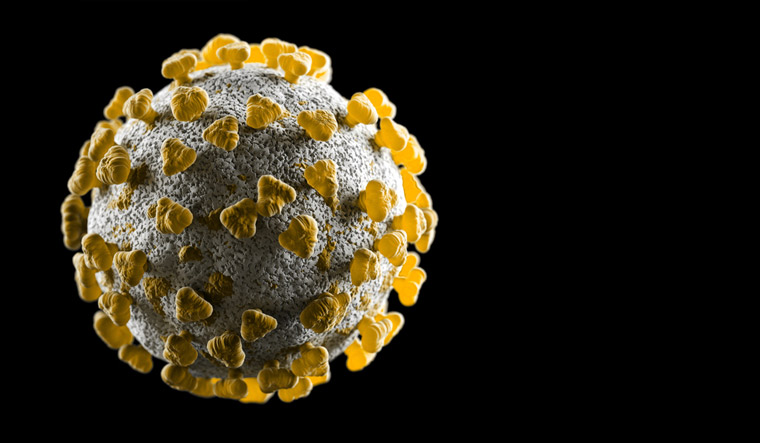It has been pretty evident over the last two years that Covid-19 impacts different people differently. When the pandemic began, in the early 2020, it was clear that age and comorbidities increased the risk of severe distress and death. Thus, senior citizens were told that the more isolated they were, the safer they were.
However, as the pandemic raged, other patterns emerged. Not every diabetic or senior had it bad, many had a light brush with even the deadly Delta variant. Yet, there were younger, seemingly healthy individuals, who developed severe pulmonary distress—many even died within days.
A cross continent study that pored through a host of data, has now concluded that there are over a thousand genes which are linked with developing serious Covid-19, and most of these genes particularly impact the functioning of the Natural Killer or NK cells. These are a set of lymphocytes which have a big role in the body's defence mechanism, they specifically attack viral infected cells and thereby control early signs of cancer.
The findings of the study are significant as they indicate that some individuals are genetically predisposed to have a more severe attack than others. Thus, knowing your risk conditions— genetic as well as physiological—makes a person forewarned. The findings are the first step towards a precision medicine approach to Covid-19. A genetic test can subsequently be developed to assess a person's genetic vulnerability to the disease. Prevention and cure can thus, be tailor-made.
The research was conducted by teams from UK's University of Sheffield and Stanford University in the US. Using machine learning, they identified more than 1,000 genes linked to the development of severe Covid-19 cases that required breathing support, or were fatal. The team was also able to identify specific types of cells in which those genes act up. It is one of the first studies to link coronavirus-associated genes to specific biological functions.
Johnathan Cooper-Knock, clinical lecturer at the Department of Neuroscience, University of Sheffield and co-author of the study, said: “We discovered the genetic architecture underlying Covid-19 infection, and found that these 1,000 genes account for three quarters of the genetic drivers for severe Covid-19. This is significant in understanding why some people have had more severe symptoms of Covid-19 than others.”
The study has just got published in the journal, Cell Systems. It was led by senior author Michael P. Snyder from the University of Stanford in collaboration with genetics instructor Sai Zhang and neuroscientist Cooper-Knock, who is currently a Stanford visiting scholar.
The team used several large data sets to unpack the genetics. The first data set contained genetic information from healthy human lung tissue. and it helped identify gene expression in 19 different types of lung cells, including epithelial cells that line the respiratory tract and are the first defense against infection. Another set of data came from the Covid-19 Host Genetics Initiative, one of the largest genetic studies of critically ill coronavirus patients. The researchers looked for genetic clues in the data — DNA mutations, called single nucleotide polymorphisms — that might indicate if someone is at a higher risk for severe Covid-19. They tracked whether some mutations occurred more or less often in Covid-19 patients with severe disease.
“Mutations that continued to appear, or were notably absent, in the patients who developed severe Covid-19 suggested those variations might be behind the infection’s severity. But genetic mutations on their own can be difficult to interpret. To better understand their findings, the team used other data describing which regions of the genome are important for different cell types within lung tissue. By overlapping the mutations onto the cell-specific genomes the researchers could pinpoint which genes were dysfunctioning and within which cell-types,'' said a release issued by the University of Sheffield.
The team was able to also zero in on the type of cells which harboured faulty gene expression. Using machine learning too, they zeroed down to the NK and T cells, both of which are lymphocytes, and part of the human body's first line of defence mechanism. Within the NK cells, a subtype called CD56 bright was considered important.
Cooper-Knock said: “NK cells, which humans are born with and are the body’s first line of defence against infection, are known for their ability to destroy viruses and cancer cells. NK cells also help produce a range of immune system proteins called cytokines. One cytokine, interferon gamma, is a key activator of immune cells. Acting in concert with interferon gamma, NK cells mount an immediate and coordinated defense against viral infections.'' He added that “NK cells are like the generals directing the war. They mobilise other immune cells, telling them where to go and what to do. We found that in people with severe coronavirus infection, critical genes in NK cells are expressed less, so there’s a less robust immune response. The cell isn’t doing what it’s supposed to do.”
Snyder likened Covid-19 risk genes to harmful variants of the BRCA genes that predispose some people to breast and ovarian cancer, and said that the findings lay the foundation for a genetic test that can predict who is born with an increased risk for severe Covid-19. This can lead to precision treatment, and even prevention.
“Imagine there are 1,000 changes in DNA linked to severe Covid-19. If you have 585 of these changes, that might make you pretty susceptible, and you’d want to take all the necessary precautions,” he said. Cooper-Knock added that drugs which can kickstart sluggish NK cells are already proposed to treat some types of cancer. “The drugs bind to receptors on the NK cells and trigger them to have a more robust response,” he said. Trials of NK cell infusions for severe Covid-19 are under way.



